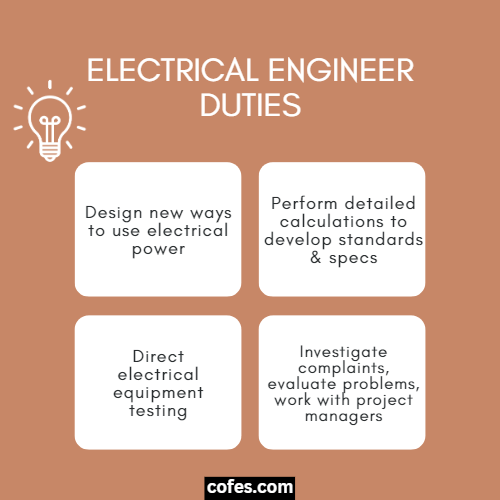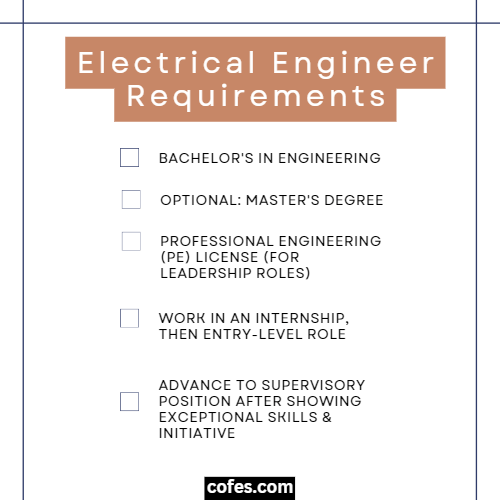The Ultimate Job Guide: The Electrical Engineer
Jobs as electrical engineers are growing in numbers, pay, and respect.
However, they can be challenging to find if you don’t have the proper education and training.
These jobs take skilled minds and crafty hands for all types of office and fieldwork.
The main benefit of a career in electrical engineering is that you can work in any industry you want and in just about any location that interests you.
Wherever there is electricity, there will be electrical engineers.
Electrical Engineer Information
| Office Job Title | Electrical Engineer |
| Average Salary | $91,979 |
| Stress Level | Medium |
| Work / Life | High |
| Job Satisfaction | High |
| Career Advancement | High |
Job Description: Electrical Engineer
What Is An Electrical Engineer
An electrical engineer, as mentioned above, is employed wherever electricity is necessary.
So, where there are items such as power lines, cell phones, toaster ovens, light bulbs, office buildings, car charging stations, solar panels, or homes, you will find electrical engineers.
So let’s start from the beginning.
When you start engineering, you can pick from a range of disciplines.
You could go to school for mechanical, geological, materials, construction, environmental, or computer engineering, to name a few.
These disciplines range in pay, stability, and desirability.
Electrical engineering jobs fall in the middle of all of them.
This constant demand makes it a solid career with continual upward mobility and pay increases.
What Does An Electrical Engineer Do On A Daily Basis?
As an electrical engineer, you will be focusing on developing electrical wiring, circuits, and the internal construction of anything electric.
You would be working on anything from a small appliance like a toaster or potentially the massive windmills that generate electricity.
You could be developing new products, testing different electrical designs, or working on the actual physical mechanic field.

Responsibilities, Duties & Roles Of An Electrical Engineer
Being an electrical engineer means having a hands-on job that requires attention to detail but constant satisfaction from solving problems and learning new skills.
You may start low at the beginning, but with time you can advance through the EE ranks.
Just make sure you have a solid education and experience.
You may even want to think about grad school if you’re going to work at a more prestigious firm or company.
Those will be more competitive.
Salary of an Electrical Engineer
Average Salary
The average salary for an electrical engineer is $91,979.
This pay is dependent on where you are employed and at what type of firm.
Government or municipality jobs will most likely pay less but require fewer hours.
Consulting firms or private companies will pay more but will be more demanding on performance.
Starting Salary
Starting as an electrical engineer, you will only make between $65,627.
However, you won’t stay at that level long.
Seniority and work experience are essential to the career of an electrical engineer.
Therefore, you should expect to get raises with every jump in the job title.
Senior Salary
Senior salaries for electrical engineers will be significantly higher than the average pay.
Those senior electrical engineers make an average of $110,679 per year.
How To Become An Electrical Engineer
The Entry Level: Certification, Training & Degree
If you want to become an electrical engineer, the best route is to get an undergraduate degree in electrical engineering from a technical-focused school.
You shouldn’t get a Bachelor of Arts.
It needs to be a Bachelor of Science in Electrical Engineering.
This difference matters because a BS has higher standards for science and mathematics.
Beyond an undergraduate degree, you will want to think about the experience.
It doesn’t matter where you get the experience.
It would be best if you spent your summers working with your hands and building electric devices or fixing electrical wiring.
This basic job could be at an appliance repair shop or a hobby shop.
It doesn’t have to be at Apple’s secret R&D lab.
Other Skill Sets, Requirements & Qualifications
The absolutely necessary skill you will need is attention to detail.
There is a long list of qualities that go along with that.
They include problem-solving, eagerness to learn new things, intuition, good with your hands, etc.
However, make sure that you enjoy the work.
That is the primary way to excel in electrical engineering and just about any job,
How Long Does It Take To Become An Electrical Engineer
It takes four years in an undergraduate college degree program to become an electrical engineer.
However, that doesn’t mean you only want to do four years.
You could decide that more advanced learning is necessary for your specialty.
It will make you more attractive to higher-paying private firms.
Is It Hard To Become An Electrical Engineer
It isn’t hard to become an electrical engineer.
You need to like subjects like math, chemistry, and physics.
Electrical Engineer Career Paths
The Electrical Engineer Roadmap
Each electrical engineer will exit their education with little to no real-world experience.
Intern programs don’t matter that much.
So, this means your boss will put you at the bottom of the totem pole.
You may be called an EE1 or Electrical Engineer Level 1 or something similar.
You will be able to advance up the levels quickly based on the number of years you have spent as an electrical engineer.
Projections For Growth In Electrical Engineer Jobs
With more people turning to new solutions to rising energy needs, there is a growing need for electrical engineers with the answers to help the world.
This need could mean more renewable energy solutions, more electric cars, or even more battery-operated devices.
Regardless, the job market for an electrical engineer has a projected growth of 3%, which is a bit slower than average.
In Summary: Is Electrical Engineering A Good Career?
Being an electrical engineer is a great career.
It is one of the few jobs where you can have both an office and field job.
You could choose to pursue more desk work or more fieldwork.
They each have their advantages, and they each pay well.
Plus, you will always be employable.
Always being employable is a hard thing to say about other careers.

Working Conditions
Can An Electrical Work Remotely From Home?
It is dependent on the needs of the company.
For example, it is most likely impossible to work from home if you have a field job.
However, if you are drafting schematics, then it’s possible to work remotely.
How Many Hours Does An Electrical Engineer Work?
An electrical engineer will work at least the maximum weekly hours.
You shouldn’t expect to have a lot of downtimes.
There will always be some system that either needs attention, replacement, or installation.
This requirement means that you will be working 40-hour weeks.
Depending on the type of job, you could have hazard or emergency hours to work as well.
Can An Electrical Engineer Work Part-Time
It is doubtful that you will have the opportunity to work part-time as an electrical engineer.
Most likely, there will be too much work for part-time employment.
If that is something that you need, you may want to look elsewhere.
What Are The Average Vacation Days Of An Electrical Engineer?
Bosses freely give vacation days to electrical engineers.
These are usually prime components of the benefits package that electrical engineers get.
However, depending on your job, you may have to request time or else lose your prime spots.
Alternative Careers & Similar Jobs to an Electrical Engineer
- Computer Engineer
- Safety Engineer
- Sound Engineer
- Product Engineer
- Petroleum Engineer
- DevOps Engineer
- AI Engineer
- Sales Engineer
- Engineering Technician
- Maintenance Engineer
- Nuclear Engineer
Electrical Engineer Resume Tips
- Always highlight your education first
- Don’t list anything before undergrad college
- You don’t need to put lots of detail in the education section
- Just make sure that it hits all of the essential common facts
- Make sure you list all of your experiences, no matter how small.
- Go into detail about your responsibilities and roles
- These details should be the bulk of your resume
- Hobbies and interests are not needed
Electrical Engineer Interview Questions
Question 1: What do you think is the key to group communication?
Why This Works: You need to determine if this person can lead a practical engineering or construction team.
Question 2: Are you attentive to details, or do you like the bigger picture?
Why This Works: You need to make sure that they will stick to the details in their jobs to get the work done efficiently and effectively.
Question 3: Are you interested in learning new skills?
Why This Works: You need to know that they will grow with technology or let the world pass them by unaffected.
You need to hire someone who will take advantage of new technologies as your electrical engineers utilize them.
Question 4: Do you enjoy working in remote areas?
Why This Works: Depending on the job, the work may take them to the field in remote areas.
Jobs Related To An Electrical Engineer
- Controls Engineer
- Project Engineer
- Test Engineer
- Design Engineer
- Communications Engineer
- Systems Engineer
- Aeronautical Engineer
For HR Manager: Tips For Hiring An Electrical Engineer
Key Characteristics To Look For In An Electrical Engineer
When looking for an excellent candidate to fill the role of an electrical engineer, you need to make sure that they can focus on the details.
You are about to hire someone for a 30-year career.
They should live in the details.
Besides that, communication skills are primary.
They will need to explain wants, needs, and other corporate requirements up the chain.
If they can’t do this, your company may suffer.
Minimum Level Of Education & Experience
Look for people with at least a 4-year undergraduate degree in some engineering field.
You will learn much of the knowledge in the area and on the job.
So, it isn’t vital that they have a background in electrical engineering, but they have a solid foundation in engineering itself.
Sources
- https://www.salary.com/research/salary/general/electrical-engineer-salary
- https://www.ziprecruiter.com/Salaries/What-Is-the-Average-Electrical-Engineer-Salary-by-State
- https://www.mtu.edu/engineering/outreach/welcome/salary/
- https://motivationjob.com/advices-skills/what-are-the-jobs-of-electrical-engineer/
- https://www.bls.gov/ooh/architecture-and-engineering/electrical-and-electronics-engineers.htm
- https://www.bls.gov/oes/current/oes172071.htm#ind
